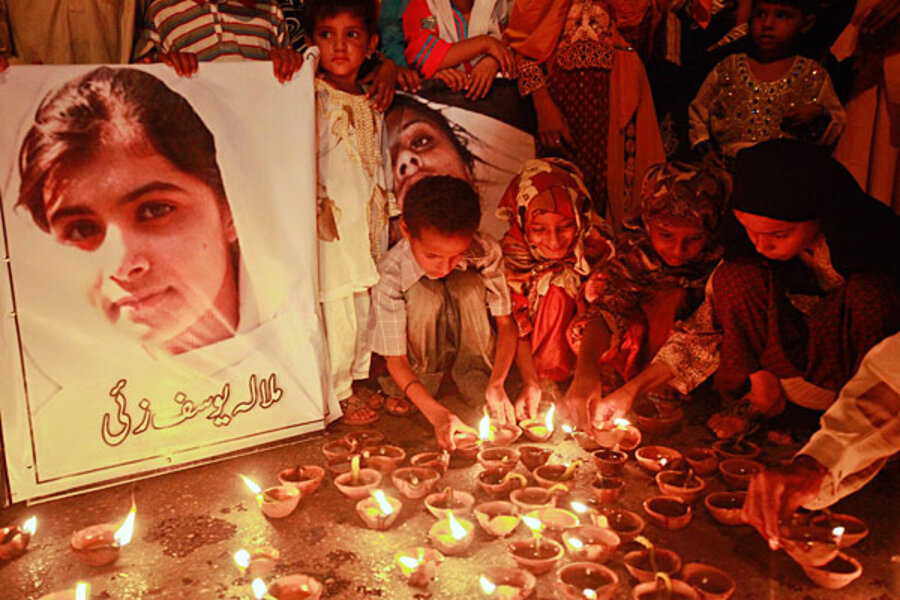Pakistani police arrest suspects in schoolgirl shooting
Loading...
| Mingora, Pakistan
Pakistani police have arrested a number of suspects in the case of a 14-year-old girl shot and wounded by the Taliban for promoting education for girls and criticizing the fundamentalist Islamic movement, officials said Friday.
The shooting of Malala Yousufzai along with two classmates while they were on their way home from school Tuesday horrified people in Pakistan and internationally. The shooting has been followed by an outpouring of support for a girl who earned the enmity of the Taliban for publicizing their acts and speaking about the importance of education for girls.
The Taliban have claimed responsibility for the shooting, saying that the girl was promoting "Western thinking."
Providing more details, a Taliban spokesman said the top leadership of the Taliban's Swat Valley chapter decided two months ago to kill Yousufzai in a carefully planned attack after her family ignored repeated warnings.
Police have been questioning people in the town of Mingora, where the shooting took place.
Mingora police chief Afzal Khan Afridi said arrests had been made, but he declined to give any details about the number of people detained or what role they're suspected in having in the shooting. He said he did not want to endanger the ongoing investigation.
Interior Minister Rehman Malik told reporters Friday that the two gunmen who staged the attack were not among those arrested, but he said investigators had identified the masterminds and efforts were under way to capture all those involved.
The Taliban spokesman, Sirajuddin Ahmad, said her family had been warned three times — the most recent warning coming last week — before the decision was made to execute her.
Ahmad said the local Taliban leader Maulana Fazlullah and his deputies selected three attackers, including two trained sharpshooters, who carefully studied the girl's route home from school.
Even before the Taliban took over the Swat Valley, Fazlullah's radio broadcasts spread fear among residents in the area. The group first started to exert its influence in 2007 and quickly extended its reach to much of the valley by the next year. They set about imposing their will on residents by forcing men to grow beards, preventing women from going to the market and blowing up many schools — the majority for girls.
Malala wrote about these practices in a journal for the BBC under a pseudonym when she was just 11. After the Taliban were pushed out of the valley in 2009 by the Pakistani military, she became even more outspoken in advocating for girls' education. She appeared frequently in the media and was given one of the country's highest honors for civilians for her bravery.
Fazlullah, along with much of the Swat Taliban's top leadership, escaped the offensive and is believed to be operating from a base in eastern Afghanistan and sending fighters back across the border to attack northwest Pakistan.
Pakistanis across the country held services to pray for her recovery Friday. Prime Minister Raja Pervaiz Ashraf visited the hospital in Rawalpindi where she's being treated to pay his respects and check on her condition.
The school she attended in the town of Mingora in the Swat Valley also reopened. The atmosphere was grim as children and teachers tried to come to terms with what happened to their star pupil who was shot in a bus roughly 300 meters (yards) from the school.
Police were deployed around the school, but many students still stayed away.
"We have decided to open the school after two days to overcome the fear among our students that gripped them due to the attack," said one of the teachers, Zafar Ali Khan.
The school is owned and operated by the teenage activist's father, who takes great pride in his daughter's accomplishments and is a champion of education for girls.
The girl was initially airlifted from Mingora to a military hospital in the frontier city of Peshawar, where doctors removed a bullet from her neck. On Thursday, she was transferred to a hospital in Rawalpindi, where the Pakistani army is headquartered near the capital, Islamabad.
Maj. Gen. Asim Saleem Bajwa said she is being kept on a ventilator and is in stable condition. Bajwa said the bullet entered her head and went into her neck toward her spine, but it was too soon to say whether she had any significant head injury.
"Her blood pressure is normal. Heartbeat is normal, and thanks to God, her condition is satisfactory," Bajwa said.
___
Associated Press writers Munir Ahmed and Zarar Khan in Rawalpindi, Adil Jawad in Karachi, Rebecca Santana in Islamabad and Anwarullah Khan in Khar contributed to this report.







